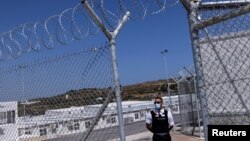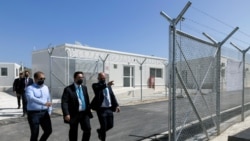Greece has opened a new migrant holding camp to ease longstanding overcrowded conditions that authorities themselves have called a disgrace. The project has humanitarian organization and migration advocates fuming, calling the European Union-funded project an "audacious" example of Europe's reluctance to effectively address illegal migration, especially in light of a new surge of Afghan migrants anticipated in the aftermath of the Taliban takeover of Afghanistan.
Speaking against the backdrop of the new camp, with its soaring fence and barbed wire, Migration Minister Notis Mitarakis said the facility on the island of Samos would provide asylum seekers a safer, more humane stay.
"We’re now implementing a new model in the camps, these closed controlled centers which provide on the one hand much better living conditions, a lot more space for each asylum seeker with all the necessary facilities and the kind of standard of living you would expect from a European Union country... but at the same time increase security provision for the benefit of asylum seekers, staff and the local communities," he said.
The new facility cost about $50 million and is largely funded by the European Union. It will house up to 3,000 people, with the first batch of some 550 refugees scheduled to move in on Monday — moved out from an older camp that critics have long decried as among the worst on the Continent for being overcrowded and filthy, with little access to bathrooms and hot water.
Rimmed with barbed-wire fencing, surveillance cameras, X-ray scanners, and magnetic doors, and tucked away miles in the rugged highlands of Samos, the new camp, say human rights advocates and aid workers, looks less homey than authorities and the EU are making it out to be.
Iorgos Karagiannis, of Doctors Without Borders, the aid group also known by its French acronym, MSF says: "For us it’s a jail. It’s a declaration of powerful policies preferred by EU leaders, rather than the care, induction and assurance of asylum."
Just a couple of miles from the Turkish coast, Samos has been inundated with refugees since more than a million people, mainly Syrians, streamed into Europe in 2015, marking the biggest migration push since World War II.
Four other Greek islands faced similar fates, left to house accommodate hundreds of thousands of people, to the distress of local communities. Now, the center-right government in Athens says it will make all those camps obsolete, replacing them with new detention centers by the end of next year.
In a separate statement, the MSF said the project marked a “perfect illustration of how criminal the EU policy is on immigration,” preferring, as MSF puts it, to hold and detain people escaping violence, punishing them for wanting to be safe.
MSF billed the project a disgrace and warned that it would add to the trauma of displaced people, as Europe braces for a fresh migratory push following the Taliban takeover in Afghanistan.
Since coming to power, the government of Kyriakos Mitsotakis has taken a hard line on migration. While migratory flows have dropped more than 80% in recent years, largely because of the COVID-19 pandemic, the government in Athens has vowed to block any further illegal entries.
Earlier this month, it tripled the size of a soaring wall along its land frontiers with Turkey. It is also considering setting up floating barricades across the Aegean to block rickety rafts from sneaking in with migrants.
What is unclear is the position Turkey will take, Greek government officials tell VOA.
With tensions brewing anew between the two age-old foes, some officials fear Turkish President Recep Tayyip Erdogan may use the migrant issue to put new pressure on the European Union for more financial aid.
Greece fears that if Erdogan doesn’t get what he wants from the EU, he might allow migrants to leave Turkey unimpeded.





